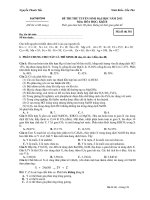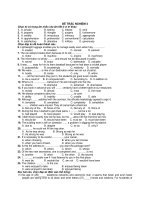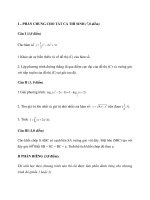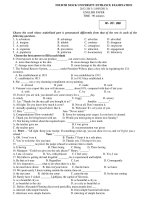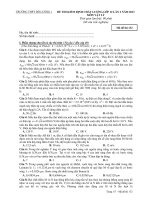Đề 12.Doc
Bạn đang xem bản rút gọn của tài liệu. Xem và tải ngay bản đầy đủ của tài liệu tại đây (116.7 KB, 11 trang )
ĐỀ 12
A. MULTIPLE CHOICE QUESTIONS
I. PHONOLOGY: (10pts)
1. Choose the word whose underlined part is pronounced differently.
1. A. fought
B. bought
C. drought
D. ought
2. A. promise
B. devise
C. surprise
D. realise
3. A. noon
B. tool
C. foot
D. spoon
4. A. think
B. there
C. theme
D. thumb
5. A. machine
B. church
C. China
D. chase
2. Choose the word that has a different stress pattern from the others.
6. A. consequently
B. profile
C. initiate
D. project
7. A. obedience
B. curriculum
C. benefactor
D. moustache
8. A. arithmetic
B. assassinate
C. agriculture
D. controvert
9. A. compulsory
B. technology
C. academic
D. eliminate
10. A. inheritance
B. mathematician
C. communication
D. tuberculosis
II. VOCABULARY & STRUCTURE: (20pts)
1. No sooner had we started the picnic ____ the rain began pouring down!
A. than
B. when
C. that
D. and
2. You really shouldn't buy that car. I know the engine is fine, but most of the bodywork has been ____ away by
rust.
A. eaten
B. dissolve
C. crumbled
D. erases
3. Not only ____ visit Japan but they plan to stop off in the USA as well?
A. they plan to
B. they must
C. will they
D. are they paying
C. will leave
D. shall leave
C. he'll being
D. he'll have
C. For as hard as
D. So hard as
C. being told
D. having told
C. Did I know
D. By knowing
4. I'll hand over all my files to my assistant before I ____.
A. am leaving
B. leave
5. By the time Brown's daughter graduates, ____ retired.
A. he
B. he has
6. ____ you try, you can never get them all right.
A. How hard
B. However hard
7. On ____ he had won, he jumped for joy.
A. telling
B. he was told
8. _____ earlier, I would have done it for you.
A. Had I known
B. If I knew
9. Conservationists are worried that many potential valuable ____ of plants and animals are threatened with
extinction.
A. examples
B. brands
C. variations
D. species
10. He had an excellent grade in his examination ____ the fact that he hadn't worked particularly hard.
A. in spite of
B. although
C. because of
D. on account of
C. fainted
D. faint
C. bloomed
D. blossomed
11. The girl felt ____ with hunger.
A. faintly
B. fainting
12. During the war, the black market in luxury goods ____.
A. flourished
B. flowered
13. The job requires a(n) ____ for hard work in different conditions.
A. ability
B. skill
C. faculty
D. capacity
14. Strong protests were made ____ with demands for an international enquiry.
A. joined
B. added
C. coupled
D. included
15. Although I explained the situation he didn't seem to ____ the degree of danger he was in.
A. seize
B. grab
C. catch
D. grasp
16. The restaurant is popular with film stars and the ____.
A. like
B. same
C. similar
D. such
17. As he walked along the landing, he ____ himself in the mirror at the top of the stairs.
A. glimpsed
B. glanced
C. gazed
D. glared
18. He was caught using forged bank notes to pay for goods and charged with ____.
A. deception
B. fraud
C. embezzlement
D. theft
19. Mohandas K. Gandhi, ____ Mahatma, lived a noble life of poverty to work for independence.
A. that was called
B. was called
C. called
D. calling
20. The politician gave a press conference to deny the charges that had been ____ at him.
A. targeted
B. levelled
C. accused
D. blamed
III. READING COMPREHENSION: (20pts)
Passage 1. Read the passage below carefully and choose the best answer.
Langston Hughes was one of the greatest American writers of the twentieth century. He was born in Joplin,
Missouri, and moved to Cleveland at the age of 14. Several years later he spent one year in Mexico before
attending Columbia University in New York. For a few years after that, he roamed the world as a seaman,
visiting ports around the world and writing some poetry. He returned to the United States and attended
Lincoln University, where he won the Witter Bynner Prize for undergraduate poetry. After graduating in
1928, he traveled to Spain and to Russia with the help of a Guggenheim fellowship. His novels include Not
without Laughter (1930) and The Big Sea (1940). He wrote an autobiography in 1956 and also published
several collections of poetry. The collections include The Weary Blues (1926), The Dream Keeper (1932),
Shakespeare in Harlem (1942), Fields of Wonder (1947), One Way Ticket (1947), and Selected Poems
(1959). A man of many talents, Hughes was also a lyricist, librettist, and a journalist. As an older man in
the 1960s, he spent much of his time collecting poems from Africa and from African-Americans to
popularize black writers. Hughes is one of the most accomplished writers in American literary history, and
he is seen as one of the artistic leaders of the Harlem Renaissance, the period when a neighborhood that
was predominantly black produced a flood of great literature, music, and other art forms depicting daily
city life for African-Americans.
1. What is the main topic of this passage?
A. The life of Langston Hughes
B. The Harlem Renaissance
C. African-American writers
D. American twentieth-century writers
2. Where ____ was Langston Hughes born?
A. Spain
B. New York
C. Missouri
D. North Carolina
3. As used in the passage, which of the following words could best replace the word “ports”?
A. islands
B. ships
C. friends
D. harbors
4. To which of the following movements might Shakespeare in Harlem refer?
A. The Civil War
B. The Harlem Riots
C. The Harlem Renaissance
D. The Civil Rights Movement
5. What provided Hughes with assistance for his travel to Spain and Russia?
A. His job as a reporter
B. His career as a soldier
C. A literary fellowship
D. A college study program
6. The word “talents” in the passage could be replaced by which of the following?
A. desires
B. abilities
C. strategies
D. careers
7. According to the author, what did Hughes do during the later years of his life?
A. write short stories
B. popularize African-American writers
C. advocate racial equality
D. write about life in Harlem
8. Which of the following could best replace the word "accomplished” as used in the passage?
A. successful
B. prolific
C. brilliant
D. imaginative
9. Which of the following can best substitute for the word “depicting" in the passage?
A. congratulating
B. blessing
C. screening
D. portraying
10. According to the passage, Langston Hughes was all of the following
EXCEPT:
A. a novelist
B. a poet
C. a historian
D. a journalism
Passage 2. Read the passage below carefully and choose the best answer.
When the first white men came to America, they found vast amounts of natural resources of tremendous
value. Forests covered a large part of the nation; later gas, oil and minerals were found in unbelievable
amounts. There was a great abundance of very fertile soil. Forests, prairies, streams, and rivers abounded
with wildlife. So vast were these resources that it seemed that they could never be used up. So forests were
destroyed to make way for farmland. Grassland and prairies were plowed and harrowed. Minerals and oil
were used in great quantities to supply a young industrial nation. Almost every river became the scene of
factories, mills and power companies. Mammals and birds were slaughtered for food and sports. Within a
short time, the results were obvious. Floods caused millions of dollars' worth of damage yearly.
The very fertile soil washed away or blew up in great clouds. The seemingly inexhaustible oil and minerals
showed signs of depletion. Rivers were filled with silt from eroding farms and wastes from factories. Many
of the rivers were made unfit for fish. Several species of birds disappeared, and some mammals seemed on
the verge of going. Future timber shortages were predicted. In short, Americans soon came to realize that
some sort of conservation program must be set up, if future, as well as present, Americans were to share in
the resources that are the heritage of every American.
1. The title below that best expresses the main idea of this selection is ____.
A. what the first white men found in America
B. the causes of timber shortages
C. the loss of topsoil
D. the story of America's natural resources.
2. It seemed to the early American settlers that _____.
A. game was scarce
B. forests should not be cut
C. the natural resources were inexhaustible
D. there was a shortage of minerals.
3. The use of America's natural resources by the early settlers was ____.
A. careless
B. scientific
C. unbelievable
D. predicted
4. Much of the fertile soil of America has ____.
A. sunk deep into the earth
B. been eroded by wind and water
C. been covered by lakes
D. become the scene of factories
5. One reason many of our rivers are no longer suitable living places for fish is that ____.
A. too many fish have been caught
B. foods have caused much damage
C. a conservation program has been set up
D. factories have dumped wastes into the rivers
6. Another word for "fertile” is ____.
A. wet
B. productive
C. useful
D. irrigated
C. reared
D. wounded
C. very tired
D. that cannot be used up
C. occasion
D. possibility
7. Another word for “slaughtered” is ____.
A. killed
B. caught
8. The word "inexhaustible” is closest meaning to ____.
A. boundless
B. uncountable
9. Another word for “verge” is ____.
A. peak
B. brink
10. The word "heritage” is closest meaning to ____.
A. ownership
B. possession
C. things have been passed on from earlier generations
D. property
IV. GUIDED CLOZE TEST: (10pts)
1. Read the following passage and decide which option A, B, C or D best fits each space: (10 points)
Reports that the government is about to (1) ____ the go ahead to plans for the building of a new runway at
London's Gatwick airport have angered local residents and raised fears of increased noise and exhaust
pollution. The (2) ____ plans also include permission for additional night flights and will (3) ____ the
compulsory purchase of farmland, as well as the demolition of a number of private homes. According to
sources close to the Ministry of Transport, the government is known to be concerned by the increasing (4)
____ of traffic at London Heathrow, where there are no plans for further runways in the foreseeable (5)
____ Gatwick is widely (6) ____ as a better (7) ____ for expansion than London's third airport, Stansted,
which still suffers from poor transport links. A spokesperson for the Keep Gatwick Quiet association, (8)
____ up of local people, accused the government of going back on promises made before the General
Election. “We were told then that the airport authority had no (9) ____ of building another runway, and we
believe that the government has a duty to (10) ____ its pledges. Prominent figures in the government are
also believed to be concerned at the news, although the Prime Minister, interviewed last night, is quoted as
saying that reports were “misleading”. However, he would not give an assurance that plans for building a
runway had definitely been rejected.
1. A. sign
B. make it
C. give
D. approve
2. A. controversial
B. debatable
C. notorious
D. doubtful
3. A. involve
B. concern
C. assume
D. need
4. A. sum
B. size
C. volume
D. length
5. A. years
B. period
C. time
D. future
6. A. regarded
B. believed
C. felt
D. held
7. A. potential
B. outlook
C. prospect
D. likelihood
8. A. made
B. set
C. brought
D. taken
9. A. desire
B. intention
C. wish
D. objective
10. A. bear out
B. count on
C. pull off
D. stand by
2. Read the passage and choose the word or phrase that best fits each space. Circle the letter A, B, C or D.
Do you want to take part in the battle to save the world's wildlife? Animal Watch is a book which will (1)
____ you in the fight for survival that (2) ____ many of our endangered animals and show how they
struggle on the (3) ____ of extinction. As you enjoy the book's 250 pages and over 150 color photographs,
you will have the (4) ____ of knowing that part of your purchase money is being used to (5) ____ animals
(6) ____. From the comfort of your armchair, you will also discover the terrible results of human (7) ____
for land, flesh and skins.
Animal Watch is packed with fascinating facts. Did you know that polar bears cover their black noses (8)
____ their (9) ____ so they can hunt their prey in the snow without being seen, for example? Or that for
each orangutan which is captured, one has to die? This superb publication has so impressed Britain's
leading wildlife charity that it has been chosen as Book of the Year, a (10) ____ awarded to books which
are considered to have made a major contribution to wildlife conservation. You will find Animal Watch at a
special low an introductory at all good bookshops, but hurry while stocks last.
1. A. combine
B. involved
C. bring
D. lead
2. A. meets
B. opposes
C. forces
D. faces
3. A. edge
B. start
C. limit
D. end
4. A. satisfaction
B. enjoyment
C. virtue
D. value
5. A. enable
B. help
C. allow
D. assist
6. A. preserve
B. conserve
C. revive
D. survive
7. A. greed
B. interest
C. care
D. concern
8. A. with
B. by
C. for
D. from
9. A. feet
B. claws
C. paws
D. toes
10. A. symbol
B. title
C. trademark
D. nickname
B. WRITTEN TEST
I. VERB TENSES/FORMS: (10pts)
Supply the correct form of the VERB in brackets to complete the passage.
Man has made great strides in ail the fields of science, particularly medicine. For instance, research work in
the laboratories at last (1. CONQUER) ____________________________ poliomyelitis, one of the most
devastating diseases. Although the Salk vaccine (2. NOT BE) __________________________ one hundred
percent effective, it (3. DECREASE) _____________________________ the case of polio considerably.
Tuberculos is once (4. KNOW) __________________________ as the white plague (5. STUDY)
____________________________ intensively. As a matter of fact, it is curable if is detected in its early
stages. We still have cancer (6. DEAL) _______________________ with, but research workers and doctors
all over the world are striving to find a way to prevent and cure it. (7. JUDGE) ______________________
form past experience we can expect that encouraging news (8. ISSUE) ____________________________
from time to time.
Heart disease, the greatest killer of mankind, is now in the process of being overcome. An example of the
techniques that (9. DEVELOP) _________________________ is that of heart massage: when a heart stops
nowadays while a patient is under anesthesia, the doctor opens the chest, massages the heart and revives the
patient. Even a few years ago, such an operation would (10. BE) ______________________ inconceivable.
Yes, science, which is just another term for knowledge, is helping mankind.
II. PREPOSITIONS AND PHRASAL VERBS: (10pts)
1. Choose the best answer.
1. I won't ____ these excuses any longer! I demand to see the manager.
A. put up with
B. put off again
C. put up for
D. put off with
C. take it off
D. wear them
2. This jacket is the kind of thing I want. Can I __?
A. try it on
B. dress it
3. I hear that miniskirts are coming back into fashion, I wonder if they'll really ____ again.
A. catch up
B. catch on
C. catch out
D. catch hold
4. I don't believe a word she said; I think she just made ____ that story.
A. down
B. out
C. off
D. up
5. Alex complained that no one invited him to any social events and that he felt ____.
A. turn out
B. left out
C. omitted out
D. gone out
6. Steve ____ his chances of passing by spending too much time on the first question.
A. threw on
B. threw off
C. threw away
D. threw in
7. Mr Jones gave his sons some money to ____ them up in business.
A. get
B. set
C. put
D. make
C. put down
D. let down
C . make out
D. go for
8. My application for a trading license was ____.
A. held down
B. turned down
9. There is more here than I can ____ on my own.
A. cope with
B. do with
10. In the early years of the twentieth century, several rebellions ____ in the northern parts of the country.
A. rose up
B. turned out
C. came up
D. broke out
2. Complete the passage with suitable prepositions.
Not everyone who blows (1) _____________________ a building is a terrorist. Demolition technicians use
explosive to destroy old buildings in order to make room (2) _____________________ new ones. Building
demolition is not as simple as just placing a bomb in a building. It is a complex process that takes weeks of
planning and preparation. Before a building is destroyed, all valuable material is removed so that it can be
recycled. In addition, all the glass is taken out of the building. After all of thesematerials have been taken
out of building, demolition technicians place explosives (3) ____________________________ some of the
walls (4) __________________________ the building. They always choose the walls that hold most of the
weight of the building. This way, the building actually falls (5) ______________________ its own weight
and fewer explosives are used. Finally, after all the preparations have been completed, it's blast time. Before
technicians actually blow up the building, they carefully check to make sure that nothing (6)
___________________________________ the building or too close (7) _________________________ it.
After all the safety checks have been made, the chief technician counts (8) _________________________
from ten (9) ____________________________ zero, he presses a button, and BOOM! The building falls
(10) _______________________________ a perfectly planned explosions.
III. WORD FORMS: (10pts)
1. Give the correct form of the words in brackets: (10 points)
1. Forcing children to use their right hand can cause _________________________________ of school, which can
impact their academic development. (HATE)
2. I admire her ________________________________________ beauty. She's old but she's still beautiful. (TIME)
3. Although we were in danger, Ann seemed quite ______________________________________ . (CONCERN)
4. The statue is a lifelike _______________________________________________ of Chris Jesus. (REPRESENT)
5. The principal said some _____________________________ words to the pupils before the exam. (COURAGE)
6. The ______________________________________________________ horse ran away from the fire. (FRIGHT)
7. _____________________________ are unpleasant, but it will be nice when we get into the new house. (MOVE)
8. The ____________________________________ meeting has been arranged for 3 p.m. next Friday. (PROVIDE)
9. Jim is very disorganized and not very ________________________________________________. (BUSINESS)
10. Her _____________________________________________________ has made her a lot of enemies. (SPEAK)
2. Read the passage and fill each blank with the correct form of the word given.
THE ART OF GIVING AND TAKING
Gift exchange, which is also called (0) ________________________ (CEREMONY) exchange, is the
transfer of goods or services that, although regarded as (1) ____________________ (VOLUNTEER) by
people involved, is part of the expected social (2) ________________________ (BEHAVE). Gift exchange
may be distinguished from other types of exchange in several respects: the first offering is made in a
generous manner and there is no haggling between donor and (3) ____________________________
(RECEIVE); the exchange is an expression of an existing social relationship or the establishment of a new
one that differs from (4) _______________________ (PERSON) (market relationships, and the profit in
gift exchange may be in the sphere of social relationship and prestige rather than in material advantage. The
gift exchange cycle entails (5) ____________________________ (OBLIGE) to give, to receive, and to
return. Sanctions may exist to induce people to give, (6) ____________________________________
(APPROVE) or loss of prestige resulting from a failure to do so. (7) _______________________________
(REFUSE) to accept a gift may be seen as rejection of social relations and may lead to enmity. The
reciprocity of the cycle rests in the necessity to return the gift; the prestige associated with the appearance
of (8) ______________________________ (GENEROUS) dictates that the value of the return be (9)
__________________________ (APPROXIMATE) equal to or greater than the value of the original gift.
Alongside its obvious economic functions, gift exchange is (10) _______________________ (SIGNIFY)
expression of social relations.
IV. ERROR IDENTIFICATION: (10pts)
1. Identify and correct the one word or phrase (A, B, C or D) that must be changed in order for the sentence to
be correct.
1. (A) A progress (B) has been made toward (C) finding a cure (D) for bird flu.
2. (A) Can't you think (B) of (C) anything more intelligent (D) to tell?
3. (A) There are only (B) few people who (C) still want to (D) stay in the village.
4. (A) All almost the electricity for (B) industrial use conies (C) from large generators (D) driven by stream
turbines.
5. (A) The more you (B) pull on a square knot, (C) the tightest it (D) gets.
6. (A) Please remember not (B) calling my house (C) between 3 pm and 4 pm (D) this afternoon.
7. When you (A) firstly meet (B) someone, you (C) should not ask (D) personal questions.
8. (A) Walking into (B) the kitchen, I (C) saw my mother (D) washed the dishes.
9. Kim (A) missed her plane yesterday (B) because a traffic jam (C) on her way to (D) the airport.
10. People (A) have used leather (B) to make shoes (C) since hundreds (D) of years.
2. There is one mistake in each of the following sentences. Find and correct it.
1. For such an experience and able teacher, discipline was not a problem.
2. Peter's father had him to repeat the poems many times.
3. They didn't seem to take any notice of that the teacher said.
4. Tom's very good at science when his brother is absolutely hopeless.
5. I watched the train to leave until it was out of sight.
6. Maria asked Sandra whether she knew the post office had been at strike for the past week.
7. Never before have so many people in the United States interested in soccer.
8. Despite the identity of the attacker is known to the police, no name has been released.
9. Nobody watched, so the little boy took the packet of sweets from the shelf and putting it in his pocket.
10. More and more women are now joining the pay labor force worldly.
Mistakes
Correction
1
2
3
4
5
Mistakes
Correction
6
7
8
9
10
V. OPEN CLOZE TEST: (10pts)
1. Fill in each gap with one suitable word.
Although the world's energy resources have (1) ___________________ many millions of years to produce,
we (2) __________________ quickly beginning to exhaust these supplies. Recently UN committee
reported that (3) __________________ world’s oil and gas supplies would (4) ______________________
about 100 years if used carefully. The report stated that there (5) ______________________ be enough oil
and gas for a century only if the present demand could (6) ____________________________ controlled. If
the demandcontinued (7) ____________________________ grow, the report said that fuel supplies would
last for less (8) _____________________ forty years. According to the report, (9) ____________________
governments now take steps to control the amounts of fossil fuels (10) ______________________ are used.
2. Read the passage and fill in each blank with ONE suitable word.
EARTHQUAKES
An earthquake is one of the most terrifying natural phenomena. We generally think (1) ________________
the ground we stand on as solid and completely stable. An earthquake can shatter that idea instantly when
we see the ground move and buildings fall (2) _____________________. We only hear about earthquakes
in the news every now and again, but (3) _______________________ are actually an everyday occurrence.
In fact, our planet experiences (4) ___________________________ than three million earthquakes a year.
However, the vast majority of (5) ______________________ earthquakes are extremely weak, and some of
the stronger quakes affect uninhabited places, where they go largely unnoticed. It is only big quakes (6)
________________________ densely populated areas that get our attention. (7) ______________________
quite recently, nobody was sure what caused earthquakes. There is still a certain amount of mystery
surrounding them today, (8) ___________________________ we now have a much clearer understanding
of the natural movements of rock beneath the surface of the earth that (9) _________________________
the ground above shake. Enormous progress has been made over the past century.
Seismologists have identified the forces that cause earthquakes, and developed technology that can tell us
(10) _____________________ size. They can even say where major earthquakes are likely to occur.
Unfortunately, what they have not yet found is a way of predicting exactly when an earthquake is going to
happen.
VI. SENTENCE TRANSFORMATION: (20pts).
Finish each of the following sentences in such a way that it is as similar as possible in meaning to the sentence
given.
1. She became interested in wildlife conservation, so she joined Greenpeace.
But _______________________________________________________________________________________
2. Lately I have thought of nothing but work.
I have been rather ___________________________________________________________________________
3. You brought the umbrella but it didn't rain.
You needn't ________________________________________________________________________________
4. They are soon accustomed to swimming.
It is ______________________________________________________________________________________
5. She is proud of being such a good cook.
She prides _________________________________________________________________________________
6. The heavy rain made it impossible for us to have our picnic.
Had ______________________________________________________________________________________
7. His jealousy increases with his love for her.
The more __________________________________________________________________________________
8. “If you wanted to use my car, you should have asked me first, Tom” said Mary.
Mary criticized _____________________________________________________________________________
9. He not only failed in his exam but also had a road accident.
Not only __________________________________________________________________________________
10. I will marry her and I don't care how old she is.
No matter ________________________________________________________________________________


